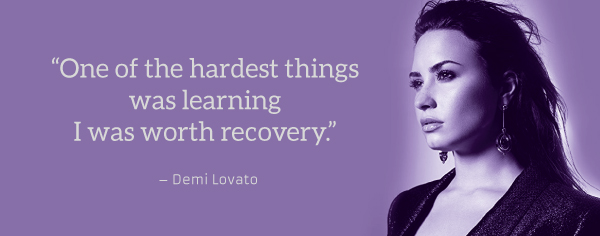Demi Lovato’s Relapse Teaches us How to Ask for Help
“One of the hardest things was learning I was worth recovery.” – Demi Lovato
Recently, Demi Lovato, a well-known singer, celebrity, and superstar revealed she relapsed. After, celebrating six years of recovery this year, Demi returned to engaging in her addiction. Demi has always been open about her substance use, addictions, and mental illnesses. In her new single, “Sober,” she shares her relapse experience to the public.
by Lara Frazier
Her lyrics divulge the guilt and shame she feels around her relapse. “Momma, I’m so sorry, I’m not sober anymore. And daddy, please forgive me for the drinks spilled on the floor. To the ones who never left me. We’ve been down this road before. I’m so sorry, I’m not sober anymore.”
Celebrities who are open about their sobriety become heroes to the many people who are living in recovery or struggling with addiction or mental health issues themselves. It shows that celebrities are just like us – they have issues and they can overcome them.
When a celebrity relapses, or commits suicide, or has some type of psychotic break, the world focuses on them. The positive thing about this focus is that it brings attention to the millions of people who are suffering from their own mental health issues. The negative thing is that the celebrity, who was once on a pedestal, has fallen and he or she must live with disappointing their fans and the public at whole.
However, relapse is incredibly common. As a person in long term recovery myself, I went through many relapses before finally getting sober. At first, my relapses felt like failures and mistakes. They made me believe that I had no chance at getting sober. However, when I flipped the script and started to look at my relapses as a learning experience, I became stronger.
My relapses showed me what was missing from my recovery. It helped me analyze what I had not been doing and what I had been doing. It also showed me that I am human. No one is perfect and if I can come back to sobriety after multiple relapses, anyone can.
We don’t need to look at relapse like a failure. We don’t lose what we learned in the time, we are sober. We don’t have to believe that we are starting over from day one. Relapses teach us about ourselves. They also reveal how powerful addiction is and how important it is to put your recovery as your number one priority.
In the last five years of my recovery, I have worked on reframing my thoughts to more positive ones. This is one of the hallmark principles of cognitive behavioral therapy – reframing our thoughts and our thinking. I learned in my 12 step meetings that my actions don’t affect my thinking; my thinking affects my actions. Thus, I started to look at my recovery as a gift. I focused on what was good about my recovery and stopped finding ways to think about how bad recovery could be.
One of the best ways to think differently was to express gratitude and create gratitude lists. In the beginning of my recovery, I used to roll my eyes at people who would say they were a “grateful alcoholic.” I thought “how could you be grateful to be an alcoholic – isn’t that an oxymoron?”
When my sponsor told me to write a gratitude list daily, I would try to listen to her, but then I would get lost in my own negativity. However, as I started praying and staying quiet, I noticed the very small moments in my life that were beautiful. I started paying attention to the now – to the present – to what was happening right in front of me.
At about two and a half years sober, I committed to a daily gratitude practice with about seven other women. Soon, my life started feeling more beautiful and the truth was that my life had always been beautiful. Yet, I wasn’t paying attention.
We can use this same practice in overcoming relapse. We can see what we learned from the experience. We can come to understand that everything is always a lesson and never a mistake. I used to make a list of all the things I learned from my relapse. It helped me move beyond the guilt and shame.
Although, Demi Lovato, has expressed remorse and shame around her relapse – I hope she knows she will be OK. People who have overcome addiction are the most resilient and strong people I have ever met. In the end of Demi’s song “Sober” – she promises she will get help and apologizes to the people who looked to her as a role model. Demi’s single “Sober” shows us that there is bravery and courage in asking for help, even after a relapse.

ABOUT LARA
Lara Frazier is a truth-teller, a sobriety warrior and a writer. She is a FIERCE believer in the power of owning our stories and is a strong advocate for addiction recovery. Lara shares a story of healing: in sobriety, through addiction, in life and love, and in all the other big huge moments of fear and magic that we rarely talk about, but we should. Find more of Lara’s work on her website at www.larafrazier.com or follow her on Instagram @sillylara.
We can help.
If you have recently relapsed or need help returning to recovery, please call Clean Recovery Centers today.


